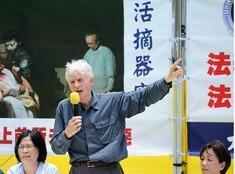Returning to Hong Kong after seven years to assist in building public awareness about ongoing organ pillaging from Falun Gong prisoners of conscience across China as a new crime against humanity I found cause for both hope and concern.
On a sweltering hot Sunday afternoon in late July, other guests and I joined approximately a thousand Falun Gong practitioners gathered in a sports park for speeches, mostly about the condition of democracy and universal values in the post-1997 one country, two systems realities of Hong Kong. If we attempted to do this on the mainland, we'd all be in jail, probably after beatings by the security forces.
Helpful Hong Kong police in uniform were present in good numbers, presumably to keep green-shirted members of the Youth Care Association (YCA) from attacking determinedly non-violent Falun Gong. I learned earlier that the democracy-supporting Apple Daily newspaper revealed that the YCA is a local arm of the 610 office in Beijing, which has managed the persecution and murders of Falun Gong across China since mid-1999.
Hong Kong currently lacks legislation, such as Canada’s, which bars inciting hatred against any identifiable religious or cultural community. Consequently, the YCA was able to use ear-splitting loudspeakers to transmit venom continuously against Falun Gong throughout the speeches by all 18 of us invited speakers. The din was so loud that I could hardly hear the event hostess even though she stood less than a meter away.






